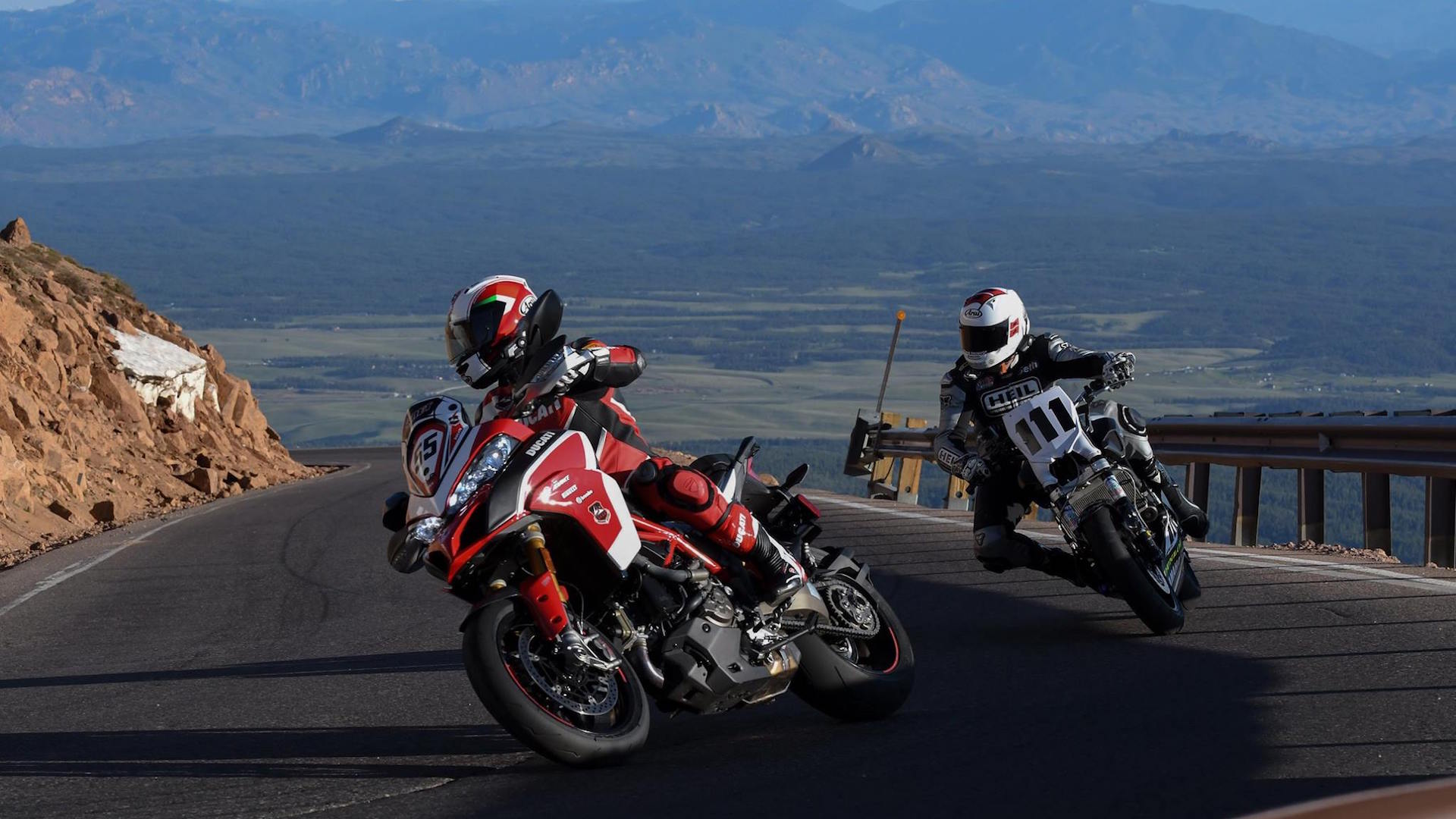

Motorcycle racer Bobby Goodin was killed in 2014 at the Pikes Peak International Hill Climb after he crashed his Triumph Daytona 675R at the mountain’s 14,115-foot summit. The next year, Carl Sorensen died when his Ducati 848 went off the road during a training run just a few days before the main event. These two deaths—two of just six that have taken place over the more than 90 runnings of the event—were too much for race organizers, and Ducati, to ignore.
“It was very evident to us at the organization that we needed to do something,” said Pikes Peak Hill Climb Executive Director Megan Leatham in a phone interview. “We don’t want people getting injured or dying during our event.”
Following the two fatalities, race organizers implemented three major changes in an attempt to prevent future motorcycle racer deaths, and to convince their insurance company to continue to allow two-wheeled racers to compete in upcoming years.
Following Sorensen’s death in 2015, race organizers banned all bikes that weren’t equipped with single handlebars—basically all superbikes—from competing in the hill climb. For the 2016 event, race officials also decided to be more strict with who they would allow to run the event, on both two wheels and four. In 2015, around 50 riders competed in the event, compared with just 35 riders who went up the hill in 2016.
“We’ve always vetted the competitors, but it wasn’t like a hard selection process,” Leatham said. “In 2016, we started a very strong selection process that included the competitors having to submit a request for invitation, and more. We have a car selection committee and a bike selection committee … we honestly sit down with each of those documents in front of us and it is very truly like selecting a field.”
The race official explained that the committees examine the details about each vehicle potential competitors want to run, the experience the potential racers would be bringing to the event, and any other relative qualifications that might make them a preferred choice for the hill climb.

“Our goal is to get the most professional and experienced motorcycle competitors on Pikes Peak,” Leatham said.
In addition to being selective about who can—and, more importantly, who can’t—compete in the hill climb, Ducati offered to team up with organizers in an attempt to do its part to keep mountainside motorcycle racing safe. Ducati’s Squadra Alpina Race Smart program was launched in 2016 following a collective effort between Paul and Becca Livingston of Spider Grips, Ducati USA, and Pikes Peak race organizers.

“I think there wasn’t enough attention to safety as there should’ve been,” Ducati USA CEO Jason Chinnock said. The executive also explained that even though the motorcycle manufacturer didn’t feel the need to compete in full force at the mountain following its repeated success at the race, he wanted the company to have a presence at the event.
“We talked [with race organizers] about safety and the needs of trying to improve it,” Chinnock said. “Really, Paul Livingston came up with the concept of bringing the experienced team of riders who we’ve worked with in the past who have raced for Ducati and who have won for Ducati and taking their expertise and skill. These guys have been riding the mountain for years—now they would be passing the torch to the next generation.”
The program provides any Pikes Peak motorcycle racer the ability to connect with Ducati’s professional riders for expert help and advice before the event. The hopes from Ducati and the race organizers are that the training provided by the Squadra Alpina team will help relax racer’s nerves before the big event, and also help them become better acquainted with the mountain when it’s their turn to launch up its twisting roads.

In the second year of its existence, the Squadra Alpina Race Smart program provided Pikes Peak motorcycle racers with training from (now-former) Pikes Peak record holder Carlin Dunne and Cycle World Road Test Editor Don Canet. Additionally, Ducati brought two tricked-out Multistrada 950 motorcycles for use by a professional race physician and a National Guard medic, in case the other first responders at the race needed assistance during last weekend’s event. Thankfully, the help wasn’t necessary.
The risk of motorcycles losing the ability to compete at the mountain following the two deaths was real, but these combined efforts have helped put minds at ease.
“Being motorcycle fans—all of us—we wanted to make sure we kept the [motorcycle racers] here,” Chinnock said.
“There was a lot of talk,” according to Leatham, about removing motorcycles completely from competition at Pikes Peak. “We had to sit down and look ourselves in the eye and say, ‘Do we want to continue having motorcycles on Pikes Peak?'”
In addition to the Squadra Alpina program, Ducati, the race’s motorcycle sponsor, set up a covered grid area for two-wheel competitors. Though it’s not any complex structure or paddock, the new grid allows riders more time to stay on tire warmers, and a more calm environment for pre-run preparation, according to Leatham.

“The hot grid has been a huge addition to the motorcycle program that we also implemented in 2016 with the help of Race Smart and Squadra Alpina,” Leatham said. “I think it’s a more organized fashion for them … I think that that improvement alone has helped them get into a more focused state of mind as well.”
With these additional precautions now in place, motorcycles continue to compete at the hill climb. Last weekend’s event went on without a hitch.